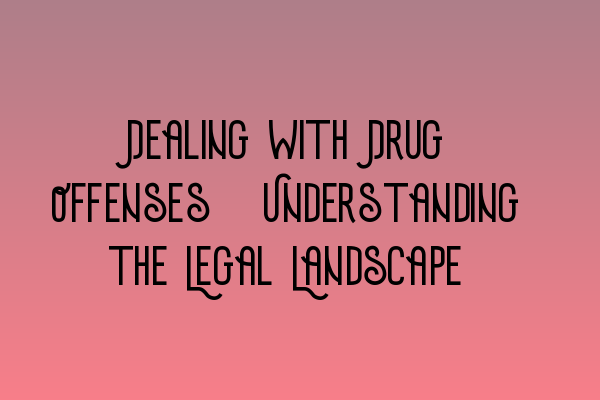Dealing with Drug Offenses: Understanding the Legal Landscape
Drug offenses are a serious matter that requires a thorough understanding of the complex legal landscape surrounding them. If you are facing drug-related charges or are simply interested in learning more about this area of law, this blog post is for you. We will delve into the key aspects of drug offenses, provide insights into the legal penalties involved, and shed light on the options available for defense. So, whether you are a law student preparing for the SQE exams or a lawyer seeking to brush up on your knowledge, this article will serve as a comprehensive guide to navigating drug offenses in the UK.
Understanding Drug Offenses
Before delving into the legal aspects, it is crucial to have a clear understanding of what drug offenses entail. Drug offenses encompass a wide range of activities, including possession, production, trafficking, and distribution of controlled substances. The penalties for drug offenses vary depending on factors such as the type and quantity of drugs involved, the defendant’s intent, and any prior criminal history.
Legal Penalties for Drug Offenses
The legal consequences for drug offenses can be severe, ranging from fines and community service to imprisonment. The severity of the penalties is determined by the classification of the drug and the specific offense committed. In the UK, drugs are classified into three categories: Class A, Class B, and Class C. Class A drugs, such as heroin and cocaine, carry the highest penalties, while Class C drugs, like cannabis, have relatively milder penalties. Knowledge of the drug classification system is crucial for understanding the potential consequences one may face.
To gain a deeper understanding of the legal penalties associated with drug offenses, take a look at the SQE 1 Practice Exam Questions article, which provides sample questions that will help you test your knowledge.
Defending Drug Offenses
When faced with drug charges, it is essential to explore all available defense options. The burden of proof lies with the prosecution, and every defendant has the right to a fair trial. Potential defenses may include challenging the admissibility of evidence, questioning police procedures, or disputing the intent or knowledge of the defendant.
For aspiring solicitors who want to delve deeper into the intricacies of defending drug offenses, the SQE 1 Practice Mocks FLK1 FLK2 article offers practice questions and scenarios that allow you to simulate real-life cases.
Getting Legal Assistance
Drug offenses are highly complex, and legal representation is crucial to navigate the legal process effectively. Engaging the services of a skilled and experienced criminal defense solicitor is advisable to ensure a strong defense, as they will have a deep understanding of drug offense laws and their practical application in court. A knowledgeable solicitor can review the evidence, advise you on the best course of action, and represent your interests in court.
For comprehensive preparation for the SQE exams, including drug offenses, consider enrolling in the SQE 2 Preparation Courses offered by SQE Criminal Law & Practice. These courses provide in-depth coverage of various legal areas and equip you with the skills necessary to excel in your legal career.
Conclusion
Understanding the legal landscape surrounding drug offenses is essential for both law students and practicing solicitors. By comprehending the various aspects, such as the classification of drugs, legal penalties, defense options, and the importance of legal representation, you can navigate drug offenses with confidence. Remember, drug offenses are serious, and seeking professional guidance is crucial to ensure the best possible outcome.
For more information on SQE exam dates and further SQE 1 preparation resources, visit the SQE 1 Preparation Courses and SRA SQE Exam Dates articles on our website.
